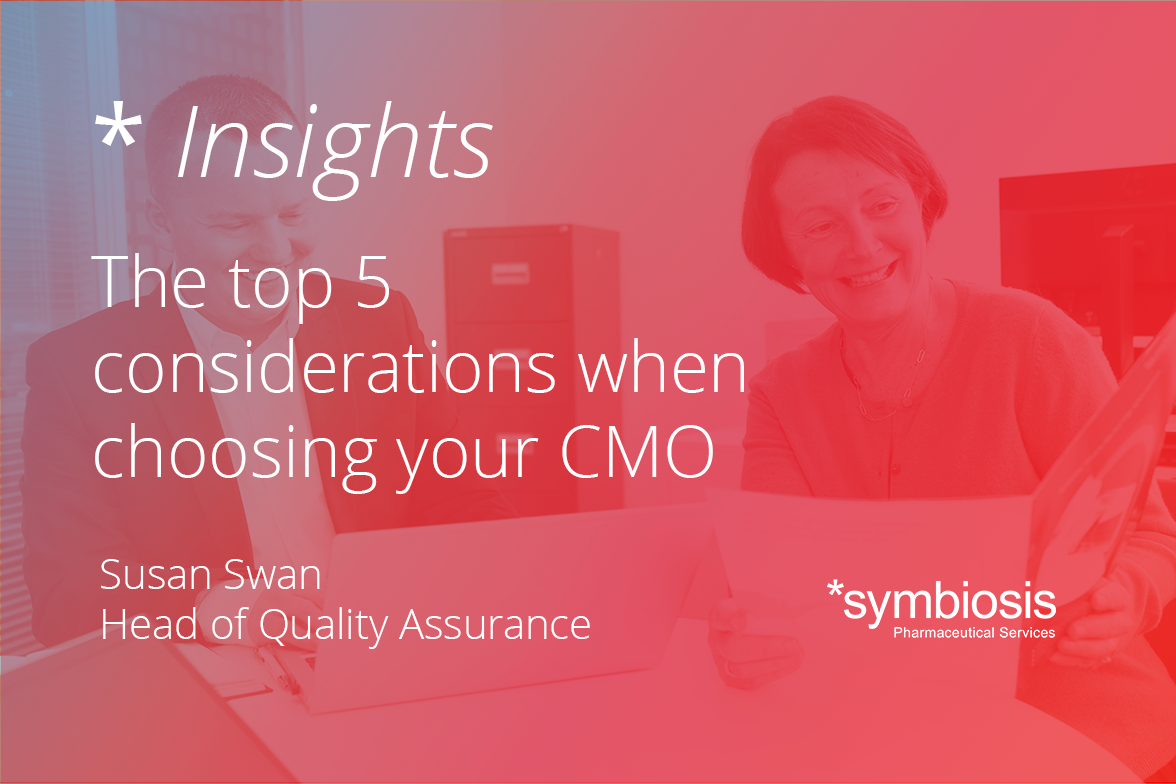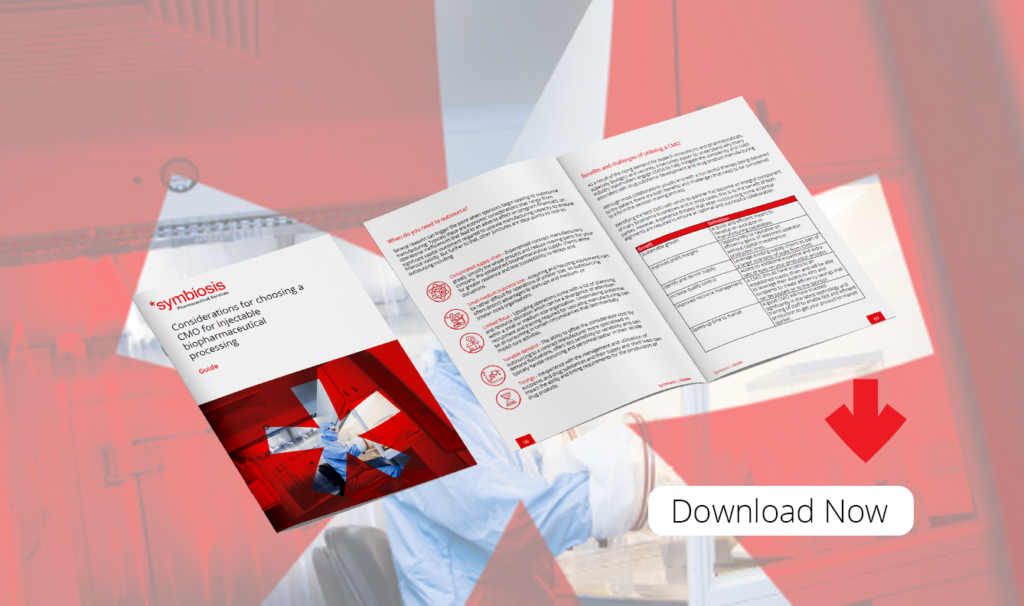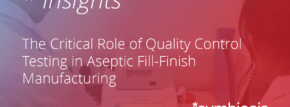The top 5 considerations when choosing your CMO partner
For any biotechnology or pharmaceutical company with an outsourcing strategy, it is no understatement to say that the selection of the best, fit-for-purpose contract manufacturing organisation (CMO) partner is a critical decision on the path to getting a new drug product to the patient. Incompatibilities can lead to a multitude of issues such as schedule delays, regulatory approval issues, competitive disadvantage and loss of revenue – which in certain instances, can bring the development of a product to a grinding halt. That’s why it is vitally important that a thorough process of due diligence is undertaken to ensure strategic alignment in the presiding principles of both parties. Those experienced in the selection of a CMO partner will tell you that there is a tangible difference between a successful CMO partner relationship and a dysfunctional one. In this article, we will leverage our experience as a successful CMO partner to many drug developers globally to highlight some of the key considerations when selecting the right CMO partner for your organisation.
(1.) Values and culture are more than a statement on a website page to organisations that achieve consistent growth and value their reputation. As a developer of a novel new therapy or medicine, it is more than likely your organisation is built on the foundational values of being results orientated, competitive and with the entrepreneurial spirit to create a breakthrough product leveraging your scientific, regulatory and medical expertise. To get a corresponding cultural fit, it will be important to align yourself with a partner that practises active listening and is responsive when engaging with stakeholders – knowing that listening builds our understanding of project requirements and expectations, while responsiveness builds trust and delivers assurances that any concerns raised are being acknowledged and actioned in a time efficient manner.
The very nature of being an effective CMO is based on the principle need for adherence to cGMP and the qualities required to successfully achieve this typically permeate the organisation’s values, culture and behaviours. For example, the CMO will have a rigorous Quality System which drives compliance. In tandem with that, a world-class CMO will also demonstrate a level of operational and cultural flexibility which will facilitate timely drug development, but absolutely not at the expense of regulatory compliance. If the CMO is a culture committed to quality, then digging deeper with a site audit will reveal one of the most important elements of QMS: the people. A solid foundation for any QMS lies within a company’s quality culture. Direct interaction with the contract firm’s personnel will often demonstrate whether or not there is a strong commitment to quality in practice.
The next consideration we recognise is of paramount importance for your selection process is establishing and fostering a (2.) synergy between both parties. When working in harmony, the combination of an exciting and innovative product and a highly effective and diligent manufacturing partner relationship typically yields a drug product that arrives at the patient in a timely and cost-effective manner and is safe and ready for use. The synergy is usually the marrying of product knowledge from the developer and process knowledge and manufacturing expertise from the CMO, which come together in a collaborative and shared focus on achieving key drug development milestones.
The synergy needs to be consistent throughout the manufacturer’s organisation, and it should be clear from the senior management to the technician on the production line that everybody shares the same values and motivation to successfully deliver the product to the customer in line with agreed expectations. Where there is that internal alignment, it should be easier to find a supplier that matches the requirements of the developer. Establishing your key milestones from a drug development perspective from the outset will stand your organisation in good stead during the vendor valuation process. If your organisation’s priorities are to facilitate flexibility, responsiveness and proactivity, then you need to evaluate how these manifest into how the parties interact with each other. For example, responsiveness is not just about communication, it’s about letting the customer know when an issue arises, and bringing constructive solutions to the table for discussion.
Creating a synergistic partnership with your CMO will define a clear shared understanding from both parties as to who has responsibility for the following:
- Who is the lead decision-maker, or is it shared? Who makes the quality decisions? Who makes the decisions on costs?
- Who is the main contact for communications, and how will that work in practice?
- Are quality and long-term relationship development the most important parts of the organization’s values, or are there others?
- What drives decisions in the manufacturing process and the wider development project, e.g., cost, or quality?
3rd on our list of vendor selection considerations is finding a CMO with an aligned specialism – As pharmaceutical bio/chemistry continues to develop with newly emerging technologies and treatment modalities, the array of specialisms that are born means that developers and CMOs need to correspondingly continue to expand their technical, physical or GMP capabilities to reflect the demand for those specialisms. From these accrued experiences and added competencies, CMOs can leverage the personnel, systems and equipment deployed in their endeavours to pass on these as transferrable process efficiencies to save time and money in the delivery of a final product.
For example, in the Antibody-Drug Conjugate (ADC) manufacturing sector, there is a current outsourcing requirement with over 70% of the ADC manufacturing operations currently being outsourced. This is a trend that is expected to continue with anticipated growth in the market at an annualised rate of over 12% during the next decade (Roots Analysis, ADC Contract Manufacturing Market (5th Edition), July 2022). If you are developing, for example, an ADC medicine, then it makes perfect sense to collaborate in processing with a CMO that has a strong track record of delivering ADCs, and recently, not just historically.
Within the context of choosing the right CMO for your manufacture, integrity is our fourth choice on our list of considerations. This should translate to a CMO who works with a sense of measured professional urgency, communicate well and promptly share good, bad and unexpected data. With a prevailing approach to be flexible in adjusting the work schedule to ensure timely delivery of product to the right level of quality, while sticking to a deliverable commitment at the agreed right price, is a partner of sound integrity. Similarly, the ability to ensure integrity of data, proprietary data privacy, and security, are important components of maintaining a steadfast CMO industry reputation and is achieved through attributes such as quality of work, reliability and, of course, integrity.
The final point (5) is problem-solving and can-do attitude – in outsourcing manufacturing of parenteral bio/pharmaceuticals, there is a demand for increased operational efficiency and new or additional capabilities. To achieve this, several factors need to be aligned including location, quality of services, GMP compliance and technical product expertise and to get this optimally synchronised, requires a great deal of problem-solving and a commitment to identifying solutions. Some CMOs will have a strong commitment to their processes and will have preferred solutions but there should be a degree of flexibility in approach to find a working solution across KPIs, personnel and incentives that suits both parties and is mutually agreed to be the best solution. The ability to deliver an excellent product and expectation-meeting service that utilise technical and procedural innovation to facilitate a culture of continual improvement ensures better results for both parties and enables lasting, mutually beneficial partnerships for both parties.
To find out more about how to choose your CMO for aseptic manufacturing, why not take a look at our guide.




